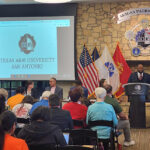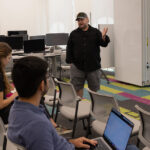By Christen Plyler
When senior education major Margaret Thompson posted this message on the university’s Facebook page at the beginning of the semester many students may have felt a pang of recognition:
“I’m not ready to have problems with e-books again this semester… Who is a point of contact who can offer assistance?”
The transition into the e-book pilot program has caused frustration for many students. But things may be changing. Thompson, and the rest of the student body, will be far less likely to run into any obstacles while accessing their e-books this semester because of three words: no access codes.
Last semester, codes were e-mailed to students so they could access their required course materials. However, the codes wound up finding homes in dormant student e-mail accounts and spam folders in students’ personal e-mails.
“Last semester I did have problems locating my access codes and getting assistance with the e-books in general,” Thompson said.
To fix this problem, Dr. Tracy Hurley, Division Head for the Schools of Business and Arts and Sciences, said she needed to find a way to delete access codes from the procedure entirely and focus on an easier path for students to access their e-books. The solution began during the highest volume of student complaints during the Fall 2010 semester. Hurley said she was aware of the problem and was examining solutions.
“I spent the first month fighting fires about access codes,” Dr. Hurley said, referring to work done during the fall of 2010. The answer to this problem would involve an integration with a familiar program: Blackboard.
Dr. Hurley says that the integration with the Blackboard system will decrease frustrations by creating easier access. Once a student logs into Blackboard, they will be able to click on a link that will guide them directly to their e-books.
“I’ve had very few issues so far this semester. And compared to last year, very few frustrated student e-mails. This transition has been the best thing since sliced bread,” Dr. Hurley said.
Senior English major Mercedes Torrez has been required to have e-books during both the Fall 2010 and Spring 2011 semesters.
“I’ve noticed the improvements. My e-books have been a lot easier to access through blackboard,” Torrez said.
An e-book stands for an electronic book. It is equivalent to the conventional printed text, however it can be read on a computer and/or several other digital media devices. It can also include interactive content like hyperlinks and multimedia.
The e-book pilot program began in the Fall semester of 2009 after Texas A&M University-San Antonio received a $300,000 grant from the U.S. Department of Education, which earlier in the year issued a RFP — a request for proposals — for a grant regarding course material rental programs. According to the U.S. Department of Education website, “Under this priority, we are particularly interested in projects that propose innovative efforts to increase opportunities for students to rent college course materials.”
Students who are required to purchase e-books will only have access to the virtual textbook for one year, so they are essentially renting the e-book. However, any student can request to have their e-book printed out by the institution. According to the Texas A&M-San Antonio website, “Students will pay about $0.02 per page for a printed e-book. This means that the typical printed price of the e-book will be about $10-$12.”
The e-book pilot program is designed to offer an affordable method for students to access their required course materials. The U.S. Department of Education website reports: “Through negotiations with textbook publishers Pearson, Cengage, McGraw-Hill, and Wiley, TAMU-SA negotiated greatly reduced prices for custom versions of e-textbooks. A virtual-textbook course fee of approximately 10 percent of tuition and fees will be assessed [by] each TAMU-SA student for access to required e-textbooks.”
The vision, Hurley said, was to create the most economically reasonable path for students to receive their required texts on-time. Other universities who received the grant were using this opportunity to invest in traditional printed text programs. Dr. Hurley, however, decided to evolve beside new technology and invest in the nation’s only institutionally run e-book program.
After the negotiations with academic publishers in the Spring 2010 semester, Texas A&M University-San Antonio now has the only e-book program where the institution deals directly with the publishers. This deletes bookstores from the traditional textbook purchasing procedure, which ultimately saves students more money.
“We are essentially cutting out the middle man,” Dr. Hurley said. “And by having an institutional model where it charges a course fee, that amount gets calculated into the student’s financial aid package making the student eligible for more money.”
Not every course at A&M-San Antonio requires an e-book. This is currently only a pilot program. However, says Dr. Hurley, the e-book program may be institutionalized by the university if it is deemed successful and helps the university accomplish its mission.
Senior English major Jena-Lyn Root agrees in having e-books for certain subjects like business, history and mathematics, but disagrees that the e-book program should be institutionalized across all subject areas. Root claims that reading and analyzing an English text for several hours on a bright computer screen is hard on the eyes.
“They should eliminate English courses for the e-book program. Students cannot go in depth in analyzing an e-book like they can an actual printed text,” Root said.
Proponents and critics agree that during transitional periods, frustrations and finger pointing are part of a program’s growth, but its success will lie in the program’s ability to keep improving in an attempt to meet student need.
A future plan under consideration for the e-book program is to offer devices for students so they can access their e-books in class. The type of device has not been chosen yet, Hurley said, because conversations are underway to explore several styles to see which one will work best for the student body.
So, are students noticing improvements with the e-book pilot program?
Many said there is a marked improvement. Still, others disagree. Students are still more likely to say whether they like or dislike the e-book program, but don’t always articulate why.
Those who have been involved in the program from the beginning have seen a procedural improvement.
“This semester has been great. There has been no problem whatsoever,” Thompson said. “The postings throughout the campus advising students how to access the e-books have also been a great help.”






